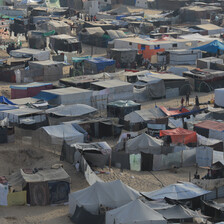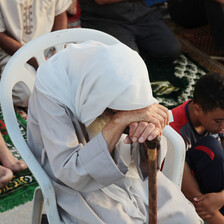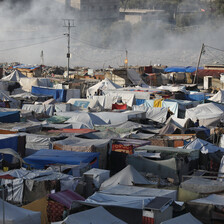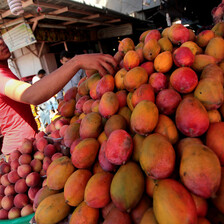The Electronic Intifada 15 May 2025
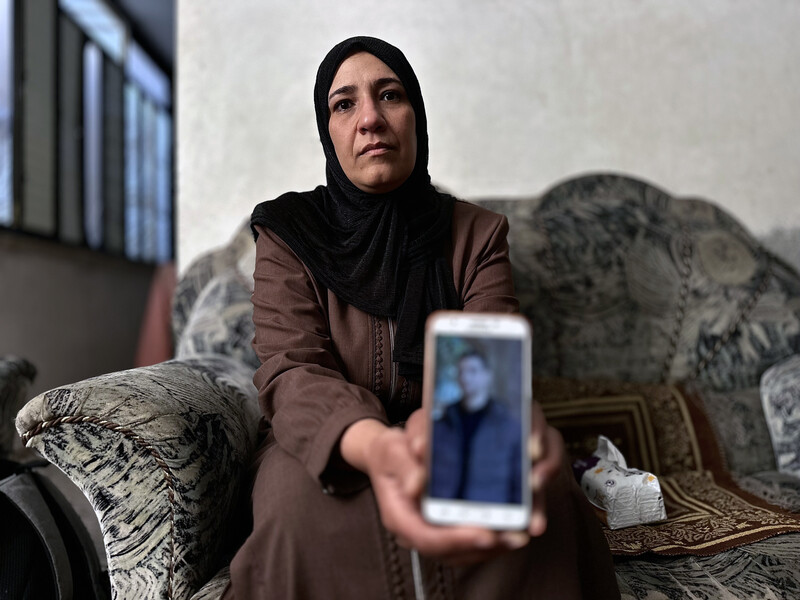
A woman shows a picture of her son who has detained by the Israeli military to an uncertain fate, on Mother’s Day in Gaza, 21 March.
ActiveStillsDuring the brief two-month pause in Israel’s genocidal aggression on Gaza, people here largely did two things: They went back to see what had happened to their homes, and they tried to find their missing loved ones.
The issue of the missing is absolutely critical in Gaza. It is now reported that over 14,000 people are missing according to the Center for Political and Development Studies, a Gaza-based think tank.
In response to this crisis, the Palestinian Center for the Missing and Forcibly Disappeared was established in Gaza in February to collect data in order to locate or at least find out the fate of those missing, many of whom may have ended up in Israeli captivity or as casualties of Israeli violence.
Ghazi al-Majdalawi, the head of the center, told The Electronic Intifada via WhatsApp that the organization aims to “provide legal support to the families of the missing, determine legal actions to pursue, and hold the Israeli occupation accountable.”
The center is looking to collaborate with international organizations like the Red Cross and the United Nations to pressure Israel for fair investigations. It also provides psychological and social support to the families of the missing. The group utilizes traditional and social media to highlight the suffering of the missing and their families in media campaigns with visual documentation.
“We strive to build partnerships with international organizations, such as the Red Cross and human rights organizations, to facilitate access to information and support our efforts.”
Yet to bear fruit
Al-Majdalawi said that once those seeking loved ones register with the center, they “classify the entered data and approve completed requests after contacting the families and verifying the accuracy of the information.”
The Gaza center then informs the relevant committee at the UN. This body consists of a number of independent experts who monitor the implementation of the International Convention for the Protection of All Persons from Enforced Disappearance.
However, the work has yet to bear fruit.
“We have not seen any clear action from the [UN] committee regarding this tragedy, especially regarding those forcibly disappeared,” al-Majdalawi said.
Collecting evidence and registering all, or even most cases, of the missing in the chaotic situation in Gaza will be extremely challenging. The center is still in its early stages and in the process of forming investigative teams. Gaza’s destroyed communications infrastructure only add to the number of those reported missing, as panicked relatives jump to early conclusions.
One fundamental question the center faces is how to compel Israel to reveal whether some of the missing have been detained or killed, and, in the latter case, where they might have been buried.
Another challenge is the identification of decomposing corpses.
“We are in urgent need of assistance from international teams specialized in forensic medicine,” said al-Majdalawi.
Currently, the center has more than 1,000 cases registered on its website, but only 200 have been moved on to full investigation.
“The number may seem small compared to the large file, but it is not,” said al-Majdalawi. “We are working according to complex mechanisms, in line with what is required when dealing with international bodies and organizations. These [200] cases are currently fully documented with complete personal data and the circumstances surrounding the disappearance.”
Kind and beloved
In October 2023, dentist Amin al-Bahtity left his home in the Shujaiya neighborhood of Gaza City and never came back.
Amin, 25 at the time of his disappearance, is the only son among 10 sisters. He lost his father at a young age and was accustomed to shouldering responsibility on his own, according to his sister Yasmin. He was an outstanding student throughout his school years and was eventually rewarded with a scholarship that covered all his university tuition fees.
The young man was not only known for his hard work but for a beautiful voice in reciting the Quran and songs. He worked as a teaching assistant at Al-Azhar University and worked as a dentist in a private clinic.
His mother, Abir, 62, said: “He always helped the students during their studies, and even after graduation, he was a source of joy for all of his sisters’ children.”
He was “kind and beloved,” Yasmin told The Electronic Intifada:
Amin had left his sister’s house in the Shaif area near Jabaliya in the morning of 27 October 2023. He carried some bread to give to a friend.
After several hours that same day, a house in the area was bombed. This was a normal occurrence as Israel’s genocidal aggression was in full force and no one thought anything of it.
But Amin did not return that day, and all attempts to contact him failed.
The family posted about him on social media, but no one responded. They asked in hospitals, but could not find his body or any clue as to his whereabouts.
But, even now, they still hold onto hope that they will find Amin alive.
And it’s not just his family.
“Doctor Amin was always kind and gentle with us,” Maha Ziyad, 24, told The Electronic Intifada.
Amin was Maha’s clinical supervisor and she remembered him as gentle and thoughtful. One time, she said, she had brought an aunt for a dental filling. When Amin found out that the patient was her relative, he had loudly praised her work, Maha said.
“He did that on purpose, for my aunt to hear.”
This weary people
Rond Suleiman did everything in her power to find her two missing sons.
Rond had fled northern Gaza in October last year during Israel’s third invasion of Jabaliya refugee camp. Her sons, Thaer, 22, and Muhammad, 19, refused to leave however.
She lost contact with them from that point but heard news of them intermittently, often from others who had been forced to flee the north. Given the brutality of Israel’s aggression on the camp, as well as the famine that struck the northern Gaza Strip at that time, she feared the worst.
“The last message I received from my sons was on the last day of last year, after which all communication ceased,” Rond told The Electronic Intifada. “Are they among the martyrs or prisoners? I don’t know.”
A few days before the ultimately doomed ceasefire was announced on 19 January, she said, she had heard that both Thaer and Muhammad had been killed in an airstrike on a house in Beit Hanoun not far from the Kamal Adwan Hospital.
“As soon as the ceasefire was announced, we rushed to Jabaliya and Beit Hanoun in search of the bodies. We searched every place, whether in Beit Hanoun or Jabaliya, but we found no trace of them,” Rond said about her and her relatives’ efforts.
Since then, she said, all attempts to learn the fate of her sons had failed. She has given their details to the Red Cross, but with no success so far, and she has called “anyone who might know anything,” but nothing.
She has now turned to the missing persons center as the last option.
She clings to a slim hope, however. An elderly sheikh from Jabaliya, who was recently released from Israeli detention, told her that he might have seen “this face” in prison when she showed him a picture of Thaer.
“Perhaps they have already been martyred, and we will not find any trace of them,” Rond said. “Dozens of martyrs are still under the rubble, and there is no equipment or teams to remove the rubble and retrieve them.”
But she paused and then continued:
“Something tells me that they are still alive, and I will meet them one day. I can still hear the sound of their voices…”
She said won’t rest until she learns what happened to her sons.
“Even if the war ends, the loss and pain do not end. A chapter will have closed, only for another chapter of searching for the missing and rebuilding life from scratch to begin. May God help this weary people.”
Tasneem Elholy is a dentistry graduate based in Gaza.
